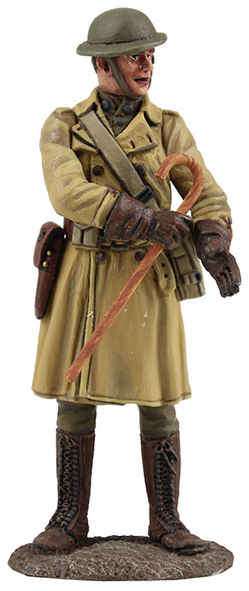 This is the eighth post in an ongoing series where I’ll be posting PDF’s from my collection of WWI era pulp magazines.
This is the eighth post in an ongoing series where I’ll be posting PDF’s from my collection of WWI era pulp magazines.
One of my long-term projects is to eventually track down some of the Australian & New Zealander fiction of the First World War, to see (amongst other things) how it compares to Canadian war fiction. Like ours, Anzac war lit is mostly out of print and neglected, which is strangely familiar (and disappointing) because the war seems to occupy a similar place in the national mythology down under as it does in the great white north.
I’d always thought Aussies and Canadians had similar sorts of reputations during the war, but rereading Robert E. Sherwood’s play Waterloo Bridge (1930) recently, I came across a passage where the protagonist Roy, an American serving with the RCR’s, offers his opinion of the other colonial army:
“The Australians are over-rated. They make a lot of noise and show off –but when it comes to proving anything in the line, well, they’re a lot of false alarms, if you ask me.” (Act II, Scene I, page 112).
Yikes! Sherwood served in the ranks of the Canadian Black Watch alongside Will Bird, and I was curious if his unflattering appraisal of the Australians was commonplace in the ranks of the CEF. I’ve read of the two colonial forces being competitive with each other but had never considered there might be outright animosity, so I was really curious about how Will Bird would treat the Australians in his short story Kind to Dogs from the May 1931 issue of War Stories.
Kind to Dogs is the only war story of Bird’s I’ve encountered (thus far) that centres upon the Australian army. At the outset we’re introduced to the hard-bitten Corporal Hurry (one of the great character names in the Bird cannon) of the “Coo-ees,” pride of the Third Australian Division. Bill Latcher is one of Hurry’s men, and frequently tests his corporal’s patience by always being thoughtful, decent, and honourable and never using the war as an excuse to compromise his personal integrity. Latcher is thus portrayed as a bit of a softie: according to his corporal “he’s too damn sentimental” and that will bring bad luck.
 Preparing to attack “Ungodly Trench” at the base of the Messines Ridge, Bill exposes himself to German scrutiny to help a lost platoon, and then once the attack gets going, he silences a Maxim gun on his own. When Corporal Hurry sees Bill standing with the German gunner, he’s frantic:
Preparing to attack “Ungodly Trench” at the base of the Messines Ridge, Bill exposes himself to German scrutiny to help a lost platoon, and then once the attack gets going, he silences a Maxim gun on his own. When Corporal Hurry sees Bill standing with the German gunner, he’s frantic:
“Shoot him, kill him!” yelled the corporal before he reached them, and he broke into sudden perspiration. That was old Bill every time, standing there like a ninny when the Kraut might act treacherous at first chance.
But Bill held up a protesting hand.
“He’s surrendered, corp,” he shouted to make himself heard. “No use killing him, he didn’t have no chance. Lookit here!”
The corporal looked and understood the desperate resistance. The young German had been chained to his gun.
“Plug him just the same,” he said hoarsely. “We ain’t got time to bother with him. Move over, if you don’t want to do it. I’ll fix him.”
“No, corp. Don’t you shoot him or I’ll report you,” said old Bill steadily. “He surrendered to me, just as soon as I got up close enough, and he had to stick it and shoot. You’d a done the same if you was him. I’ll bust that chain off him –I put his gun out of order already –and send him back as soon as there’s a chance.”
“All right,” grated the corporal. “Go ahead with your fool stunts. Some day you’ll get yourself and [a] lot of other men wiped out jist through your blasted sentiment.”
Given the Canadian reputation for killing prisoners, I’m surprised to find this exchange occurring between Australian soldiers –but then again, maybe that distance is what affords Bird the ability to write about it so candidly.
Bill Latcher continues to behave like an “old woman” according to his corporal: refusing to shoot a German dog in no man’s land, and then (if you can believe it) tending to a wounded German and letting him drink from his own water bottle! Things shortly go sideways during the Australian attack, and things are only righted through Bill’s fundamental decency.
Bird deploys one of his favourite plot devices in Kind to Dogs: a hidden trap door/secret tunnel that once again brings about a thrilling climax. And naturally, in what is becoming a running joke here, a corporal’s hiss is… (wait for it….)…. “sibilant.”
And so, to celebrate Dominion Day: a short story by a Canadian, about an Australian unit, featuring a protagonist that turns out to be a sentimental American.
I’ve cleaned up the images a bit. The PDF is below the cover image. Enjoy.

 Will R. Bird – Kind to Dogs
Will R. Bird – Kind to Dogs